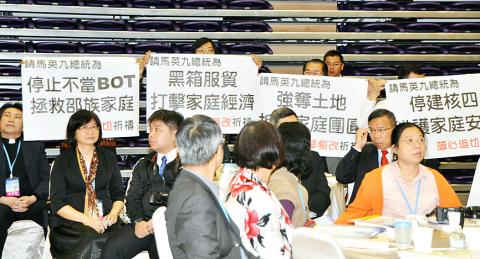President Ma Ying-jeou (馬英九) yesterday said he has heard the public’s complaints about the government, and promised to try to improve its performance amid constant protests against him.
“We’ve heard the people’s voice, and we hope the people give the government more opportunity and time. There are things that we need to do immediately, and there are things that require a little time. We will do it step-by-step,” he said while attending the 13th National Prayer Breakfast in New Taipei City (新北市).
Ma made the comments in response to a protest held at the event, in which several people holding a white banner expressing opposition to several government policies, including the cross-strait services trade agreement, the forced demolition of privately owned houses for urban renewal and the construction of the Fourth Nuclear Power Plant in New Taipei City’s Gongliao District (貢寮).

Photo: CNA
The protesters kept silent during the protest, but were still asked to leave by security. The Presidential Office later accepted a petition from them.
Ma defended the government’s efforts to improve the economy by signing economic pacts with major trade partners and creating more investment opportunities for local businesses.
He also cited the government’s handling of the public discontent over the death of army corporal Hung Chung-chiu (洪仲丘), who died on July 4 after he was confined and forced to do strenuous exercise in extreme heat, and said the government’s move to turn over the trials of military personnel to civilian courts was a positive response.
“This example represents the government’s prompt response to a request in a mature civil society. The government communicates with the people, and takes necessary actions to respond to their requests,” he said.
Later yesterday, while meeting with representatives of the electronic commerce industry at the Presidential Office, Ma said the cross-strait service trade agreement aimed to profit the whole nation, rather than a particular political party or industry.
“Our trade rivals have been speeding up their pace of signing free-trade agreements with mainland China and other nations. The advantages we created via the Economic Cooperation Framework Agreement will disappear soon if we don’t catch up,” he said, calling for the approval of the service trade pact in the legislature.
The pact, which was signed in June and opened market access to 64 local service sectors to Chinese investment, has been under strong public scrutiny over what the opposition and representatives of the service sectors called lack of transparency and prior consultation.
The legislature went on to demand the pact be screened and voted on clause-by-clause.

The brilliant blue waters, thick foliage and bucolic atmosphere on this seemingly idyllic archipelago deep in the Pacific Ocean belie the key role it now plays in a titanic geopolitical struggle. Palau is again on the front line as China, and the US and its allies prepare their forces in an intensifying contest for control over the Asia-Pacific region. The democratic nation of just 17,000 people hosts US-controlled airstrips and soon-to-be-completed radar installations that the US military describes as “critical” to monitoring vast swathes of water and airspace. It is also a key piece of the second island chain, a string of

A magnitude 5.9 earthquake that struck about 33km off the coast of Hualien City was the "main shock" in a series of quakes in the area, with aftershocks expected over the next three days, the Central Weather Administration (CWA) said yesterday. Prior to the magnitude 5.9 quake shaking most of Taiwan at 6:53pm yesterday, six other earthquakes stronger than a magnitude of 4, starting with a magnitude 5.5 quake at 6:09pm, occurred in the area. CWA Seismological Center Director Wu Chien-fu (吳健富) confirmed that the quakes were all part of the same series and that the magnitude 5.5 temblor was

Taiwan will now have four additional national holidays after the Legislative Yuan passed an amendment today, which also made Labor Day a national holiday for all sectors. The Chinese Nationalist Party (KMT) and Taiwan People’s Party (TPP) used their majority in the Legislative Yuan to pass the amendment to the Act on Implementing Memorial Days and State Holidays (紀念日及節日實施辦法), which the parties jointly proposed, in its third and final reading today. The legislature passed the bill to amend the act, which is currently enforced administratively, raising it to the legal level. The new legislation recognizes Confucius’ birthday on Sept. 28, the

The Central Weather Administration has issued a heat alert for southeastern Taiwan, warning of temperatures as high as 36°C today, while alerting some coastal areas of strong winds later in the day. Kaohsiung’s Neimen District (內門) and Pingtung County’s Neipu Township (內埔) are under an orange heat alert, which warns of temperatures as high as 36°C for three consecutive days, the CWA said, citing southwest winds. The heat would also extend to Tainan’s Nansi (楠西) and Yujing (玉井) districts, as well as Pingtung’s Gaoshu (高樹), Yanpu (鹽埔) and Majia (瑪家) townships, it said, forecasting highs of up to 36°C in those areas